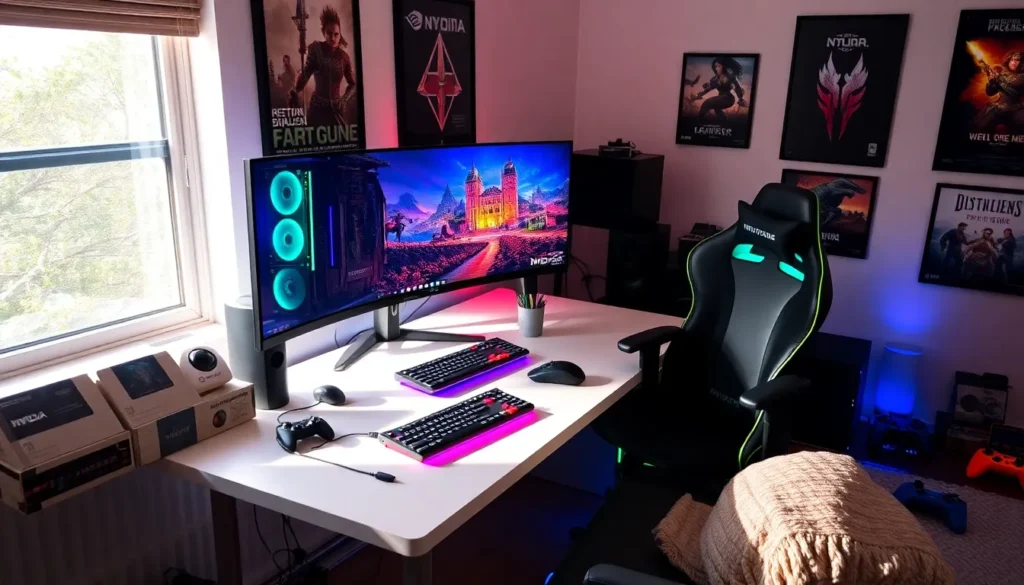Table of Contents
ToggleIn the ever-expanding realm of gaming, PC gaming stands out as a versatile and dynamic medium that has captivated audiences for decades. This article embodies the essence of a gamer’s journey through the intricacies of PC gaming, exploring its history, current trends, and future possibilities. From its humble beginnings to the complex landscape it has become today, understanding the evolution and components of PC gaming is essential for anyone looking to dive deeper into this vibrant world.
The Evolution Of PC Gaming

Key Milestones In PC Gaming History
PC gaming has undergone significant transformations since its inception. The journey began in the late 1970s with simple games like Pong that laid the foundation for future developments. By the mid-1980s, titles such as King’s Quest introduced players to graphics and storytelling that were revolutionary for the time. The demand for more immersive experiences surged with the rise of 3D graphics and sound in the 1990s, evidenced by classics like Doom and Quake.
As the new millennium approached, PC gaming saw the introduction of online multiplayer capabilities, transforming how people connected through games. The release of World of Warcraft in 2004 marked a significant milestone in the realm of MMORPGs and community engagement, showcasing the potential for persistent online worlds.
Impact Of Technology On PC Gaming
The evolution of technology directly influenced the progression of PC gaming. Graphics cards advanced rapidly, with companies like NVIDIA and AMD pushing the envelope, enabling games to feature hyper-realistic visuals. In parallel, advancements in processor architecture improved game performance, allowing for smoother gameplay and more complex AI behaviors. Besides, the advent of SSDs has significantly reduced load times, enhancing the overall gaming experience.
The Rise Of Digital Distribution
Popular Platforms And Their Influence
Digital distribution has revolutionized the way PC gamers access content. Platforms such as Steam, launched in 2003, have become essential for gamers and developers alike. Steam not only allows for easy installation and access to a vast library of games, but it also supports indie developers through its Greenlight program, enabling unique and creative titles to find their audience.
Other platforms like Epic Games Store and GOG provide additional alternatives, often featuring exclusive titles and competitive discounts that contribute to the ongoing shift toward digital distribution. The ability to access games instantaneously has encouraged gaming’s growth, creating a thriving online community around both mainstream and indie titles.
The Role Of Indie Games In PC Gaming
Community Engagement And Esports
Indie games have carved a niche within the PC gaming landscape, showcasing creativity and innovation that frequently pushes the boundaries of conventional game design. Titles such as Hollow Knight and Celeste have not only achieved critical acclaim but also established vibrant online communities. These communities foster player interaction and contribute significantly to the game’s longevity.
Plus, the rise of esports has positively impacted indie games. Independent developers are increasingly designing competitive titles that engage players and help tournament play, merging the thrill of competition with community involvement.
Building Your Own Gaming PC: A Step-By-Step Guide
Essential Components For Optimal Performance
For many gamers, building their own gaming PC represents the pinnacle of the gaming experience. It allows for customization and optimization tailored to individual preferences. When building a gaming PC, essential components include the CPU, GPU, motherboard, RAM, storage, and power supply.
- CPU: Choose a powerful CPU, like AMD Ryzen or Intel i9, as it significantly impacts overall game performance.
- GPU: A dedicated graphics card is crucial for rendering high-quality graphics. NVIDIA’s GeForce and AMD’s Radeon series are top choices.
- Motherboard: Select a compatible motherboard that supports the chosen CPU and provides ample ports and expansion slots.
- RAM: For most modern games, at least 16GB of RAM is advisable.
- Storage: SSDs are recommended for faster load times, while HDDs can supplement storage needs.
- Power Supply: Ensure your power supply unit is reliable and of sufficient wattage to support your components.
With careful planning, building a gaming PC can be an incredibly rewarding experience.
Software And Tools Every Gamer Needs
Tips For Enhancing Your Gaming Experience
Plus to hardware, the right software enhances the gaming experience significantly. Essential tools include:
- Game Launchers: Platforms like Steam, Origin, and Battle.net help manage game installation and updates effectively.
- Performance Monitoring Tools: Software like MSI Afterburner allows gamers to track GPU and CPU performance, ensuring optimal settings.
- Voice Communication: Programs like Discord and TeamSpeak are crucial for coordinated play with friends.
- Game Recording and Streaming Software: OBS Studio enables gamers to record or stream gameplay, perfect for those looking to share their experiences or build a following.
The Future Of PC Gaming: Trends To Watch
Emerging Technologies And Their Potential Impact
As technology progresses, PC gaming is set to evolve further. Emerging trends include the growth of virtual reality (VR) and augmented reality (AR), offering hyper-immersive experiences that transport players into entirely new worlds. Streaming technology also continues to improve, enabling gamers to enjoy high-end titles without the need for expensive hardware.
Sustainability In PC Gaming
Another growing trend is sustainability. Gamers are becoming increasingly aware of the environmental impact of gaming, leading to demands for energy-efficient hardware and greener gaming practices. Developers and manufacturers are expected to prioritize sustainability, creating eco-friendly products that align with these concerns.
Conclusion
PC gaming is an ever-evolving landscape characterized by rapid technological advancements and an engaged community. From its early days to the recent boom in indie games and digital distribution, it has grown into a formidable segment of the gaming industry. As trends emerge and new technologies take hold, gamers can look forward to a vibrant future where community, creativity, and innovation continue to thrive.







